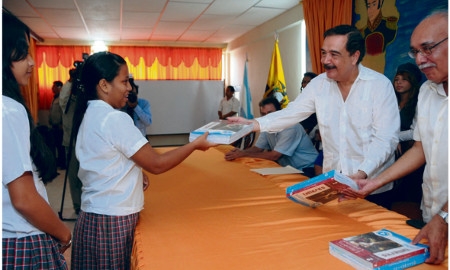Guayaquil, the most populated city in Ecuador, decided eight years ago to put into place a strong push for prosperity under the title: More education means less poverty. Led by the Mayor, Jaime Nebot Saadi, the authorities have put into action a number of programs of assistance, grants and infrastructure resources, through which hundreds of thousands of Ecuadorian students and teachers have benefited. Nebot has said on a number of occasions that education is not necessarily within his jurisdiction, but that the city authorities have an “ethical, moral, social and beneficial” duty to continue to do all it can to improve this field.
The common objective of all the programs is to improve the education of the Ecuadorian people. The most far-reaching of all the programs, More Technology, uses advances in technology to improve and optimize academic learning. The project began in 2005 and has helped 489 primary schools in the public education system and currently it is being extended to 125 schools in the secondary program.
Teachers and students have learnt how to manage technological tools, thereby narrowing the digital gap considerably in rural areas and in schools within Guayaquil’s urban areas. A total of 250,000 students have had access to IT equipment on this project.
However it is not just these schools that are benefiting. For the past year, the project has been extended to around 500 other schools in the poorer areas of the greater Guayaquil area where underprivileged children are also gaining access to new technologies under the More Technology program. Thanks to an agreement with private companies who are donating computers that are in good condition, the Guayaquil authorities are taking this project to the most disadvantaged, in collaboration with the Chambers of Production and the Guayas Agency for Regional Development (ADREG). The aim is to combine quality education with social responsibility. With all of these initiatives, education in Guayaquil has transformed from being a privilege for very few people to becoming a right for all to enjoy and share.
| More than 1,000 schools and colleges have benefited from the improvement programs in Ecuador’s education system and in school infrastructure |
More English is a project designed to strengthen the teaching of the language and is making use of the technologies and tools provided by the More Technology program. More than 120,000 students in 125 of Guayaquil’s public schools are taking advantage of this education program. Another fantastic project is More Books, which will allow 81,000 youngsters to enjoy greater access to free textbooks in all kinds of institutions across the city. This program is also run with the help of some of Ecuador’s most prominent educators and publishers and with the support of one of the most prestigious institutions in the country, the University Católica Santiago of Guayaquil, and the Ecuador Foundation.
Improvements in educational infrastructure are also an important part of the push for better standards in education across the city. The Improve School Infrastructure project deals with the repair of electrical installations, drinking water, rainwater drainage systems, bathrooms and the changing of roofing on schools. It also includes new classrooms and IT labs. The program has given a great boost to the economy and has generated jobs of which the parents of students have priority over.
This improvement program works alongside the More Books, More Technology and More English programs as well as two other local authority programs, namely: Support Grants and Exemplary Youngsters. The first supports orphans who cannot continue to pay their studies because of the death of their parents: the authorities guarantee that they can continue to study with a grant. The Exemplary Youngsters program chooses the best students from each of 125 secondary schools and awards them with the building of 250 cement houses for their families, 2,500 laptop computers and 10,000 public transport passes.

0 COMMENTS